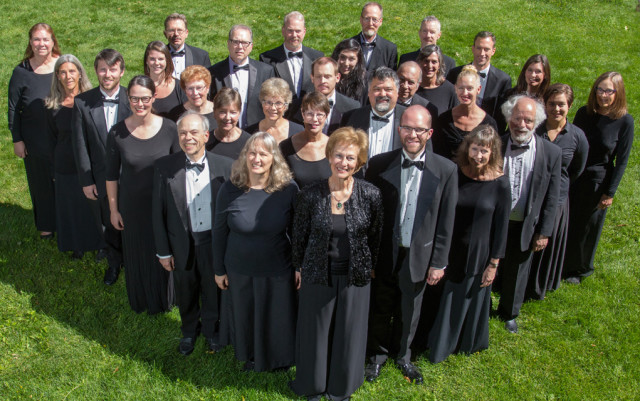
Evanne Browne, artistic director of the Baroque vocal ensemble Seicento, wants you to know that she is excited about their next concert. Very excited.
“I was thrilled to get to put this together,” she says. “This is a joyous concert. It’s just magical!”
This magical concert will be presented Friday through Sunday with performances in Denver, Boulder and Longmont. And although the title, “Scarlatti, Father and Son,” might sound like a trendy Italian trattoria, it actually refers to an important musical family of the 17th and 18th centuries.
Alessandro Scarlatti spent most of his career at the court in Naples, where his brother Francesco was first violinist. His two children also pursued musical careers, Domenico primarily in service to the royal families of Spain and Portugal, and Francesco in London and Dublin.
Almost anyone who has taken piano lessons as a child — or whose children have taken lessons — knows of Domenico Scarlatti, the titular son of the program. He famously wrote more then 500 one-movement keyboard sonatas that range from short, easy pieces in every teacher’s lesson book to challenging workouts that find their way into virtuoso recital programs.
Browne’s aim is to open up much more of the Scarlatti legacy than the well known sonatas — written for harpsichord but today played mostly on piano. Domenico wrote other works, from operas and cantatas to sacred motets and a 10-voice Stabat Mater that will end the concert. And his father, Alessandro, was one of Italy’s leading Baroque opera composers, dominating opera in Naples in the 1690s. He also wrote cantatas, other vocal works and an almost unknown set of madrigals that will be on the program.
“It’s an unusual program in that we’re doing little bits of each type of music,” Browne says. “All of the music is really lovely to hear. The audience should look forward to this, and hopefully will walk away knowing more about Scarlatti.”
The culmination of the concert will be the final piece, the Stabat Mater of the younger Scarlatti — the one known for his keyboard works. It’s about a 20-minute setting of a 13th-century hymn that expresses the sorrow of Mary standing at the foot of the cross.
“I love the Stabat Mater,” Browne says. “I’ve never conducted it, so I’m excited about that.”
One of the things that makes this work stand out is it is written for 10 voices with an instrumental bass part and a particular emphasis on the higher parts.
“We have two bass lines, two tenor lines, two alto lines and four soprano lines,” Browne explains. “When you get the four sopranos and the two altos and kind of a high tenor part, you get a lot of treble sound. The ethereal quality of having that many high voices is exceptional.”
Browne also points to the expressive quality of the music.
“It’s a beautiful setting of the text,” she says. “There’s a section that just sounds like wailing, this grief and the loss of Mary’s son. And the way he set the part of the text that talks about the soul ascending is just magical.”
The concert will open with two choral motets, one by each of the Scarlattis. The second will be conducted by Browne’s assistant, Mark Alan Filbert.
Even though the father and son are different generations, “I find those two motets to be similar,” Browne says. “Both of them are going back to traditional sacred composition techniques (from the Renaissance).”
One of Browne’s guest artists will be Charlotte Mattax Moersch, who will play several of the younger Scarlatti’s sonatas on harpsichord. A scholar as well as performer, Mattax Moersch will present a 6:45 p.m. lecture before the performances in Denver and Boulder.
Soprano Amanda Balestrieri, a Boulder favorite, will sing several arias from Alessandro’s operas and cantatas. Because sopranos — both females and male castrati — were the opera stars of the day, their arias are often particularly showy, with the singer adding extra ornaments and roulades to repeated phrases.
The most unusual works on the concert will be three madrigals by Alessandro. Again, the music is extraordinarily expressive, with unexpected chromaticism used to describe the most extreme emotions.
“The madrigals, and most of the arias, are about love, how we burn with desire or the lover’s glance turns us to ice,” Browne says. “That kind of language gives fabulous opportunities for text painting.”
Even if you don’t know anything about either Scarlatti, Browne thinks this is a concert that you should want to hear.
“All of this music is very, very accessible and uplifting,” she says. “In these times in our world and our nation, coming to hear an evening or an afternoon of delightful music would be the reason to try this.”
On the Bill: Scarlatti, Father & Son. Seicento Baroque Ensemble. 7:30 p.m. Friday, March 11, St. Paul Lutheran Church, Denver. 7:30 p.m. Saturday, March 12, First United Methodist Church, Boulder. 3 p.m. Sunday, March 13, Stewart Auditorium, Longmont. Tickets: 720-301-7747, seicentobaroque.org














